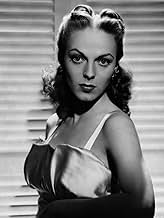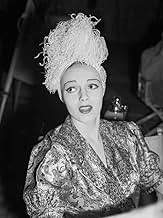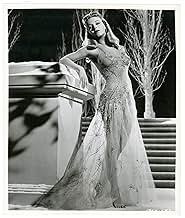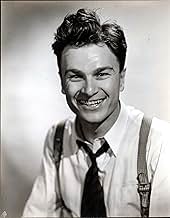Aggiungi una trama nella tua linguaA young hoofer quits vaudeville to become a composer and hooks up with a Russian ballet troupe.A young hoofer quits vaudeville to become a composer and hooks up with a Russian ballet troupe.A young hoofer quits vaudeville to become a composer and hooks up with a Russian ballet troupe.
- Regia
- Sceneggiatura
- Star
- Premi
- 1 vittoria in totale
Sarita Wooton
- Vera as a Girl
- (as Sarita Wooten)
Irving Bacon
- Second Stage Manager
- (non citato nei titoli originali)
Leon Belasco
- Mishka - Slave in Ballet
- (non citato nei titoli originali)
Symona Boniface
- Woman in Audience
- (non citato nei titoli originali)
Wade Boteler
- Second Policeman
- (non citato nei titoli originali)
Glen Cavender
- Extra as Stagehand
- (non citato nei titoli originali)
Lew Christensen
- Ballet Dancer
- (non citato nei titoli originali)
Recensioni in evidenza
I was disappointed in not hearing any of the great songs, such as "There's a Small Hotel," sung in this movie, apparently revised to accommodate its star Vera Zorina, who is a ballerina. Despite the onscreen credit for lyrics, the songs of Richard Rodgers and Lorenz Hart are used as background music throughout, while two pieces suitable to ballet were used to display Zorina's ballet skills. The first, "Princess Zenobia" started as a straight ballet, but with Eddie Albert substituting for a missing performer, it turns into a burlesque of ballet, and is a hit. I was uncomfortable with the implication that straight ballet cannot be enjoyed (which is even stated in the script). The second piece, "Slaughter on Tenth Avenue," was extremely well done and worth seeing. But here also, the writers injected other material. The impresario, Alan Hale, planned on having Albert killed at the end of the ballet. We know it and Albert learns of it while still on stage and sees the killers too, all of which creates a small amount of suspense. The overall plot is a little dumb, as in most early musicals, but I did enjoy seeing a young, dancing Donald O'Connor (playing Albert as a boy) and some of the gags supplied by Frank McHugh and Leonid Kinskey.
On Your Toes was one of Richard Rodgers&Lorenz Hart's best Broadway musicals and a landmark show in that it was one of the first to integrate ballet into the plot. Georges Balanchine did the choreography for the production that ran 315 performances in the 1936- 1937 season and was responsible for making Ray Bolger a star and getting him to Hollywood through MGM.
So when they were buying Bolger why didn't Louis B. Mayer buy the show as well? Because of that and probably because Mayer was asking too much for Bolger for Jack Warner, Eddie Albert was put in the lead.
But if we couldn't get Bolger, Jack Warner had the best guy possible for the role of Philip Dolan, III. I can't believe James Cagney didn't lobby like a madman for this role with Warner. He'd have much preferred to do this instead of The Oklahoma Kid or The Roaring Twenties, classic Cagney parts that they are.
The big hit of On Your Toes was the instrumental ballet Slaughter On Tenth Avenue, the music was played everywhere in the late Thirties. It is the center piece of the film as well, it has to be because such Rodgers&Hart classics as There's A Small Hotel and Quiet Nights are only heard as background music. The only other song which was to demonstrate Albert as vaudeville hoofer was Oh You Beautiful Doll.
I think it's a miracle that On Your Toes came out as good as it did on screen with an emasculation of the Rodgers&Hart score and the fact that the best guy on the lot for the part was passed over if they couldn't get the guy who introduced it on stage. The Brothers Warner did field some of their best character actors with such people as Frank McHugh, Leonid Kinskey, Alan Hale, and Erik Rhodes in the cast. A film that has these four guys in it has something going for it.
Vera Zorina plays the prima ballerina who it turns out knew Albert as a lad back in vaudeville days. Her ballet numbers do remain intact and show why she was THE ballerina back in the day.
But what a classic this would have been if James Cagney had done the lead and more Rodgers&Hart had been retained.
So when they were buying Bolger why didn't Louis B. Mayer buy the show as well? Because of that and probably because Mayer was asking too much for Bolger for Jack Warner, Eddie Albert was put in the lead.
But if we couldn't get Bolger, Jack Warner had the best guy possible for the role of Philip Dolan, III. I can't believe James Cagney didn't lobby like a madman for this role with Warner. He'd have much preferred to do this instead of The Oklahoma Kid or The Roaring Twenties, classic Cagney parts that they are.
The big hit of On Your Toes was the instrumental ballet Slaughter On Tenth Avenue, the music was played everywhere in the late Thirties. It is the center piece of the film as well, it has to be because such Rodgers&Hart classics as There's A Small Hotel and Quiet Nights are only heard as background music. The only other song which was to demonstrate Albert as vaudeville hoofer was Oh You Beautiful Doll.
I think it's a miracle that On Your Toes came out as good as it did on screen with an emasculation of the Rodgers&Hart score and the fact that the best guy on the lot for the part was passed over if they couldn't get the guy who introduced it on stage. The Brothers Warner did field some of their best character actors with such people as Frank McHugh, Leonid Kinskey, Alan Hale, and Erik Rhodes in the cast. A film that has these four guys in it has something going for it.
Vera Zorina plays the prima ballerina who it turns out knew Albert as a lad back in vaudeville days. Her ballet numbers do remain intact and show why she was THE ballerina back in the day.
But what a classic this would have been if James Cagney had done the lead and more Rodgers&Hart had been retained.
Except for the wonderful musical arrangement of "Slaughter on Tenth Avenue", the choreography looks less than inspired as danced by VERA ZORINA and EDDIE ALBERT. Especially if one has seen Gene Kelly and Vera-Ellen do the number in a fantastic musical highlight from WORDS AND MUSIC. And the less said about the weak comedy routines, the better.
The only compensations in this weak transfer from stage to screen (in which "There's A Small Hotel" has been relegated to background music), is the pleasant cast. Eddie Albert is his usual charming self, gifted at comedy and easily stealing most of the scenes with his nonchalant genius for comic roles. Vera Zorina demonstrates that she could act, when called upon, but her role is the stereotyped diva in distress that any capable actress could do with her eyes shut.
Alan Hale, Leonid Kinskey, Donald O'Connor (as a boy hoofer), and Frank McHugh do their standard professional jobs in assorted light comedy roles--but despite their flair, most of the one-liners fall flat.
Surely, this was a more exciting event on Broadway than it appears in its screen incarnation with Ray Bolger appearing opposite Vera Zorina. Too little time expended on a worthwhile script and too many songs missing from the original stage musical. The result is a routine backstage musical with only the "Slaughter" ballet to redeem it.
The only compensations in this weak transfer from stage to screen (in which "There's A Small Hotel" has been relegated to background music), is the pleasant cast. Eddie Albert is his usual charming self, gifted at comedy and easily stealing most of the scenes with his nonchalant genius for comic roles. Vera Zorina demonstrates that she could act, when called upon, but her role is the stereotyped diva in distress that any capable actress could do with her eyes shut.
Alan Hale, Leonid Kinskey, Donald O'Connor (as a boy hoofer), and Frank McHugh do their standard professional jobs in assorted light comedy roles--but despite their flair, most of the one-liners fall flat.
Surely, this was a more exciting event on Broadway than it appears in its screen incarnation with Ray Bolger appearing opposite Vera Zorina. Too little time expended on a worthwhile script and too many songs missing from the original stage musical. The result is a routine backstage musical with only the "Slaughter" ballet to redeem it.
Vera Zorina, Eddie Albert, Alan Hale, Jr., Frank McHugh, Leonid Kinskey, Donald O'Connor, and James Gleason star in "On Your Toes," a 1939 film based on the Broadway show of the same name, which starred Ray Bolger and had music and lyrics by Rogers and Hart. If you think you hear "There's a Small Hotel" in the background throughout this film, you are - it was one of the songs in the musical that is not performed here. Since the star is Vera Zorina, the song omissions are presumably because she wasn't a singer. You'd think Hollywood just never dubbed anyone or just never assigned a song to a different character.
At any rate, if you forget the original show, what's left is actually entertaining, with Albert playing Phil Dolan, Jr., a young hoofer turned composer who writes "Slaughter on Tenth Avenue." The two dance sections, "Princess Zenobia" and "Slaughter" are the highlights of the film, with Slaughter very importantly shown with the original Balanchine choreography.
The other highlight for me was seeing a young Donald O'Connor, who plays the Phil as a young boy in vaudeville - he's delightful.
Some trivia: the head of the ballet company, played here by Alan Hale, Jr., was played on Broadway by Monty Wooley.
At any rate, if you forget the original show, what's left is actually entertaining, with Albert playing Phil Dolan, Jr., a young hoofer turned composer who writes "Slaughter on Tenth Avenue." The two dance sections, "Princess Zenobia" and "Slaughter" are the highlights of the film, with Slaughter very importantly shown with the original Balanchine choreography.
The other highlight for me was seeing a young Donald O'Connor, who plays the Phil as a young boy in vaudeville - he's delightful.
Some trivia: the head of the ballet company, played here by Alan Hale, Jr., was played on Broadway by Monty Wooley.
Absolutely terrible film version of the hit 1936 Broadway musical by Richard Rodgers, Lorenz Hart and George Abbott.
Ray Bolger originated the role of Junior, but here we have Eddie Albert as a last-minute replacement for James Cagney who bailed from the project after Warners specifically bought it for him. Albert was on the lot, having made a small splash the year before in BROTHER RAT. Since Albert couldn't dance, a double had to be used and the character's dancing was scaled back.
Also taking a hit, most of the songs are not performed and end up as background music. So "Small Hotel," It's Got to Be Love," "The Heart Is Quicker Than the Eye," and "Quiet Night" are basically eliminated from the film, leaving the character of Peggy Porterfield (Gloria Dickson) with nothing to do. The female character of Frankie Frayne is eliminated altogether. Even the title song only shows up as background.
The other giant hit this version takes is that both the "Princess Zenobia" ballet and the "Slaughter on 10th Avenue" number are scaled way back partly because Albert couldn't dance. This also takes the oomph out of Vera Zorina's starring performance. The music portions are cut back, but the hokey comedy and lengthy Vaudeville intro were retained.
Another huge minus is the terrible direction by Ray Enright, who apparently had never seen a good movie musical. There are endless cuts during the dance numbers and zoom-ins to close-ups and cutaways to peripheral characters. And it's painfully obvious that the close-ups of dancing feet are not of Eddie Albert.
Supporting cast tries hard, but most of the Russian humor falls flat. While Leonid Kinskey is fine as Ivan, Alan Hale is an odd choice for Sergei. We also get Frank McHugh as the stage manager, James Gleason and Queenie Smith as Albert's parents, Berton Churchill as the hotel manager, and Erik Rhodes bizarrely cast as the leading ballet dancer. Notable also is Donald O'Connor as the young Junior in the Vaudeville segments.
The musical has been revived twice on Broadway (I saw a production in London starring Doreen Wells in 1985), but this is the only film version, which is a real pity because the music is wondrous, and it would have been nice to see Zorina in a full-fledged version of "Slaughter on 10th Avenue."
Ray Bolger originated the role of Junior, but here we have Eddie Albert as a last-minute replacement for James Cagney who bailed from the project after Warners specifically bought it for him. Albert was on the lot, having made a small splash the year before in BROTHER RAT. Since Albert couldn't dance, a double had to be used and the character's dancing was scaled back.
Also taking a hit, most of the songs are not performed and end up as background music. So "Small Hotel," It's Got to Be Love," "The Heart Is Quicker Than the Eye," and "Quiet Night" are basically eliminated from the film, leaving the character of Peggy Porterfield (Gloria Dickson) with nothing to do. The female character of Frankie Frayne is eliminated altogether. Even the title song only shows up as background.
The other giant hit this version takes is that both the "Princess Zenobia" ballet and the "Slaughter on 10th Avenue" number are scaled way back partly because Albert couldn't dance. This also takes the oomph out of Vera Zorina's starring performance. The music portions are cut back, but the hokey comedy and lengthy Vaudeville intro were retained.
Another huge minus is the terrible direction by Ray Enright, who apparently had never seen a good movie musical. There are endless cuts during the dance numbers and zoom-ins to close-ups and cutaways to peripheral characters. And it's painfully obvious that the close-ups of dancing feet are not of Eddie Albert.
Supporting cast tries hard, but most of the Russian humor falls flat. While Leonid Kinskey is fine as Ivan, Alan Hale is an odd choice for Sergei. We also get Frank McHugh as the stage manager, James Gleason and Queenie Smith as Albert's parents, Berton Churchill as the hotel manager, and Erik Rhodes bizarrely cast as the leading ballet dancer. Notable also is Donald O'Connor as the young Junior in the Vaudeville segments.
The musical has been revived twice on Broadway (I saw a production in London starring Doreen Wells in 1985), but this is the only film version, which is a real pity because the music is wondrous, and it would have been nice to see Zorina in a full-fledged version of "Slaughter on 10th Avenue."
Lo sapevi?
- Quiz"On Your Toes" was adapted from a Broadway musical that opened at the Imperial Theater in New York on April 11, 1936 and ran for 315 performances. Ray Bolger starred in the original stage production. The musical was revived on Broadway in 1954 and 1983.
- BlooperGeorge Balanchine's name is misspelled as "Ballanchine" in the credits.
- Citazioni
Sergei Alexandrovitch: I will not give the American audiences what they want, I will give them what they ought to like.
- Curiosità sui creditiLorenz Hart, the lyricist for the original Broadway show, receives onscreen credit, but his lyrics are never sung at all in the film.
- ConnessioniFeatured in That's Dancing! (1985)
- Colonne sonoreOh, You Beautiful Doll
(1911) (uncredited)
Music by Nat Ayer
Second number performed by the Dancing Dolans, repeated during the vaudeville bits
Danced by Donald O'Connor, Queenie Smith and James Gleason
I più visti
Accedi per valutare e creare un elenco di titoli salvati per ottenere consigli personalizzati
Dettagli
- Tempo di esecuzione1 ora 34 minuti
- Colore
- Mix di suoni
- Proporzioni
- 1.37 : 1
Contribuisci a questa pagina
Suggerisci una modifica o aggiungi i contenuti mancanti

Divario superiore
By what name was On Your Toes (1939) officially released in Canada in English?
Rispondi






















